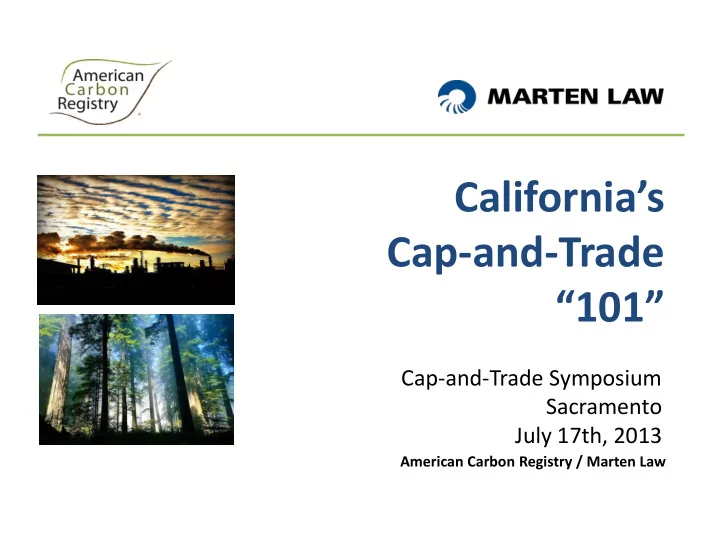

California’s Cap-and-Trade “101” Cap-and-Trade Symposium Sacramento July 17th, 2013 American Carbon Registry / Marten Law
Session Overview Symposium is about compliance instruments – acquiring, creating, buying, selling 1. California’s cap, allowances & offsets 2. The Value Chain – who is involved? 3. Framework for discussing compliance instruments
Session Overview Symposium is about compliance instruments – acquiring, creating, buying, selling 1. California’s cap, allowances & offsets 2. The Value Chain – who is involved? 3. Framework for discussing compliance instruments
California’s Cap Affected sectors: ~ 350 large businesses representing about 600 facilities 2013-14: Electricity; oil refineries; large industrial facilities; all > 25,000 tCO 2 e/year 2015: + Distributors of transportation fuels; natural gas 500 394.5 382.4 370.4 400 358.3 346.3 334 MtCO2e 300 162.8 200 159.7 100 0 2013 2014 2015 2016 2017 2018 2019 2020 Total allowances between 2013 and 2020 = ~ 2.5 billion
Allowances 2013 Free allocation Reserve Auction 2015 2018
Offsets 35 32 31 30 29 28 30 27 25 MtCO2e 20 13 13 15 10 5 0 2013 2014 2015 2016 2017 2018 2019 2020 8% of compliance obligation (~ 203 million)
Voluntary Participants Opt-In Voluntary Entity Entity within a capped sector with annual GHG emissions < 25,000 tCO 2 e Non-capped entity seeking to purchase, Voluntary Associated Entity hold, sell, retire or clear allowances or ARB offset credits Other Registered Participants Do not intend to hold allowances or ARB offset credits – i.e. Offset Project Registries, Early Action Offset Programs, Verification Bodies
Offset Credits Uncapped sectors Current Compliance Protocols only! • Livestock • U.S. Forests • Ozone Depleting Substances (ODS) • Urban Forests Four “early action” protocols Protocols Under Development • Coal Mine Methane • Rice Management
Offset Credits: who? Consultants/ service providers Voluntarily associated entity Offset Project Registry OPO (asset owner) Covered Entity Verification body APD (project developer)
Offset Credits: risk Offset Invalidation Credits issued by another program for the same period Credits overstated by more than 5% Project not in accordance with local, state , national regulations Buyer Liability (…8 years 3 years) Firms holding an invalidated credit must replace that credit to remain in compliance
Offset Credits: supply 200,000,000 150,000,000 CMM MTCO2e Rice 100,000,000 Forestry Livestock 50,000,000 ODS 0 2012 2013 2014 2015 2016 2017 2018 2019 2020 By 2020 expected shortfall of 134 MMTCO2e
Linkage California Quebec
The Big Picture
Know the rules Cost Timing Flexibility Transparency containment concerns Compliance Clearing + OTC + Reserve Forward v. What Banking Offsets Offsets periods rules anonymity Auction spot products? Risk or opportunity?
Session Overview Symposium is about compliance instruments – acquiring, creating, buying, selling 1. California’s cap, allowances & offsets 2. The Value Chain – who is involved? 3. Framework for discussing compliance instruments
Offset Value Chain What to look for/provide in an offset Who can you do business with?
Lifecycle of an Offset Concept May be invalidated Retired Registration for up to 8 years May be sold one or more times Issue Implementation Buyer liability, but… Review Verification
Stakeholders Subcontractors OPO (owner} Covered Entity APD (project developer) Verification Body VAEs (Liquidity)
Reach of ARB Subcontractors OPO (owner} Covered Entity APD (project developer) Verification Body VAEs (Liquidity)
Making an Offset Subcontractors OPO APD Verification Body
Making an Offset Subcontractors Concept Retired Registration OPO Issue Implementation APD Review Verification Verification Body
Role of the Registry Concept Retired Registration Issue Implementation Review Verification Verification Body
Transacting OPO (owner} Covered Entity APD VAEs (Liquidity)
Transacting: VAEs OPO (owner} Covered Entity APD VAEs (Liquidity)
Transacting: CEs OPO (owner} Covered Entity APD VAEs (Liquidity)
Transacting OPO (owner} Covered Entity APD Verification Body VAEs (Liquidity)
Session Overview Symposium is about compliance instruments – acquiring, creating, buying, selling 1. California’s cap, allowances & offsets 2. The Value Chain – who is involved? 3. Framework for discussing compliance instruments
Risk Opportunity
Risk Regulatory Counterparty Project Other State (repeal; Discontinues this Out of business Conversion litigation) type of work Federal preemption Insolvent Invalidation/Reversal Adoption (two flavors) Interpretation Bad faith or negligent Technology
Risk: Project Developer Regulatory Counterparty Project Other State (repeal; Discontinues this Out of business Conversion litigation) type of work Federal preemption Insolvent Invalidation/Reversal Adoption (two flavors) Interpretation Bad faith or negligent Technology
Risk: Buyer Regulatory Counterparty Project Other State (repeal; Discontinues this Out of business Conversion litigation) type of work Federal preemption Insolvent Invalidation/Reversal Adoption (two flavors) Interpretation Bad faith or negligent Technology
Managing Risk Rules Allowances Offsets Project development Allocate risk through value chain Know you counterparty Purchase Due diligence Counterparty Value chain Products Low risk Good counterparties Insurance Risk into opportunity
Remainder Morning: Offset value chain & risk by project Afternoon: Trading perspective Moving beyond the 4 current protocols
Contact Information Belinda Morris Erika Anderson California Director Of Counsel American Carbon Registry Marten Law 980 Ninth St., Suite 2060 455 Market Street, Suite 2200 Sacramento, CA San Francisco, CA 95814 94105 t. 916.520-8628 t. 415.684.9362 m. 916.402.4141 m. 415.265.6401 e. bmorris@winrock.org e. eanderson@martenlaw.com www.americancarbonregistry.org www.martenlaw.com
Recommend
More recommend